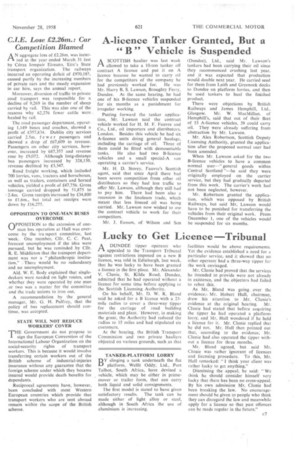C.I.E. Lose £2.26m.: Car Competition Blamed
Page 45

If you've noticed an error in this article please click here to report it so we can fix it.
Pl.A N aggregate loss of £2,26m. was incurred in the year ended March• 31 last by Coras lompair Eireann, Eire's State transport organization. The railways incurred an operating deficit of £970,185, caused partly by the increasing numbers of private cars and the steady expansion in car hire, says the annual report.
Moreover, diversion of traffic to private toad transport was responsible for a decline of 9,269 in the number of sheep carried by rail. This was also one of the reasons why 62,276 fewer cattle were hauled by rail.
The road passenger department, operating 1,149 buses and coaches, showed a profit of £357,834. Dublin city, services carried 2.5m f ewer passengers and showed a drop Of £67,609 in revenue. Passehgers, on other city services, however, increased by 687,357 and revenue rose by £9,072. Although long-distanfe bus passengers increased by 328,150, revenue declined by £3,347.
Road freight working, which included 700 lorries, vans, tractors and horseboxes, as well as trailers, containers and horsed vehicles, yielded a profit of £47,756. Gross tonnage carried dropped by 51,875 to • 2.4m. Gross receipts increased by £34,800 to £1.6m., but total net receipts were down by £16,275.
OPPOSITION TO ONE-MAN BUSES OVERCOME
OPPOSIT1ON to the extension of oneman bus operation at Hull was overcome by the tra Isport committee, last 'week. One member, Cllr. C. C. Peat, forecast unemployment if the idea were pursued, but he was reminded by • ClIr,
E. Middleton that the transport department was not a "philanthropic institution." : There would he no redundancy and no unemployment Aid, W. E. Body explained that singledeckers were needed on light routes, and whether they were operated by one man .or two was a matter for the committee and the trade unions to iron out.
A recommendation by the general manager, Mr. G. H. Pulfrey, that the policy of bus replacement should continue, was accepted.
STATE WILL NOT REDUCE WORKERS' COVER THE Government do not propose to
sign the European Convention of the International Labour Organization on the social-security rights of transport workers. This is because it would involve transferring certain workers out of the British scheme of industrial-injuries insurance without any guarantee that the foreign scheme under which they became insured would provide death benefits for dependants.
Reciprocal agreements have, however, been concluded with most Western European countries which provide that transport workers who are sent abroad remain within the scope of the British scheme.












































































































